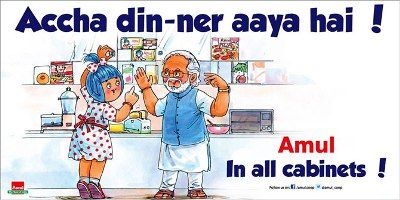FY15 sales ahead of combined food business revenue of Nestle, HUL and ITC
 Gujarat Co-operative Milk Marketing Federation, owner of Amul, has hit a top line of over Rs 20,000 crore (200 billion) for the first time in the financial year ended March 2015 -- equivalent to the combined revenue of the food businesses of its three closest rivals Nestle, Hindustan Unilever and ITC (based on their figures for FY14).
Gujarat Co-operative Milk Marketing Federation, owner of Amul, has hit a top line of over Rs 20,000 crore (200 billion) for the first time in the financial year ended March 2015 -- equivalent to the combined revenue of the food businesses of its three closest rivals Nestle, Hindustan Unilever and ITC (based on their figures for FY14).
The Anand-headquartered major reported a top line of Rs 20,735 crore (Rs 207.35 billion) for the year ended March 2015.
The co-operative does not disclose bottom line figures.
Nestle’s CY14 top line, according to its latest annual report, was Rs 9,806 crore (Rs 98.06 billion).
HUL’s revenue from beverages and packaged foods was Rs 5,043 crore or Rs 50.43 billion (or 18 per cent of its FY14 top line of Rs 28,019 crore or Rs 280.19 billion, according to its last annual report), while analysts peg ITC’s foods business at around Rs 5,700 crore (Rs 57 billion) of its Rs 8,100-crore (Rs 81 billion) FY14 turnover for the non-cigarette FMCG business (called FMCG others by the company).
If combined, the total top line works out to Rs 20,549 crore (Rs 205.49 billion).
The three companies have not announced their FY15 numbers.
Speaking to Business Standard, R S Sodhi, GCMMF’s MD, said, “Yes, we are ahead of these companies.
“But our top line growth for FY15 was 14.28 per cent over the previous year’s.
“While this rate of growth was lower than what we had achieved in FY14, the domestic consumer business grew at the rate of 21 per cent during the period under review.”
GCMMF, for the record, derives the bulk of its revenue from the domestic market.
In FY14, GCMMF’s top line grew at the rate 32.1 per cent, ahead of its five-year compound annual growth rate of 23 per cent.
This was on account of soaring milk prices, which the co-operative could pass on to consumers, resulting in better value growth, FMCG analysts said.
In FY15, however, milk prices crashed by as much as 20-25 per cent, as private dairies cut purchases resulting in excess supply to co-operatives such as GCMMF.
The latter was therefore unable to raise prices, they said.
This up and down movement of milk prices has prompted GCMMF in the last few years to shift its attention to value-added products, which, according to industry sources, give the co-operative about 35-40 per cent of its top line on Monday.
The balance comes from liquid milk. Five years ago, liquid milk was 80 per cent to 90 per cent of the company's top line, say experts tracking the sector.
However, categories such as as UHT milk (or milk in tetra packs), dahi, butter, milk-based beverages and ice-creams have seen higher growth, Sodhi says, in the region of about 25-35 per cent per annum.
In contrast, liquid milk has been stagnant, growing in low single digits, experts say.
Youth products, in specific, is something that the dairy major, Sodhi explains, has been focusing attention on aggressively this year.
“Products such as Amul Cool, Epric ice-cream, a malted beverage called Amul Pro and an energy drink called Stamina are some of the products that we are counting on,” he said.
Of the above four, Epic ice-cream, Amul Pro and Stamina were launched in the last two months.
While Epic ice-cream has been launched in metros such as Delhi and Mumbai, GCMMF is expected to take it to more cities and is expected to begin promoting Amul Pro and Stamina in the next few months.
The co-operative will also launch Amul Cool in PET bottles shortly.
Image: An Amul advertisement. Photograph: Kind courtesy, Facebook

.jpg)






